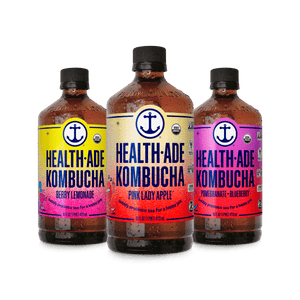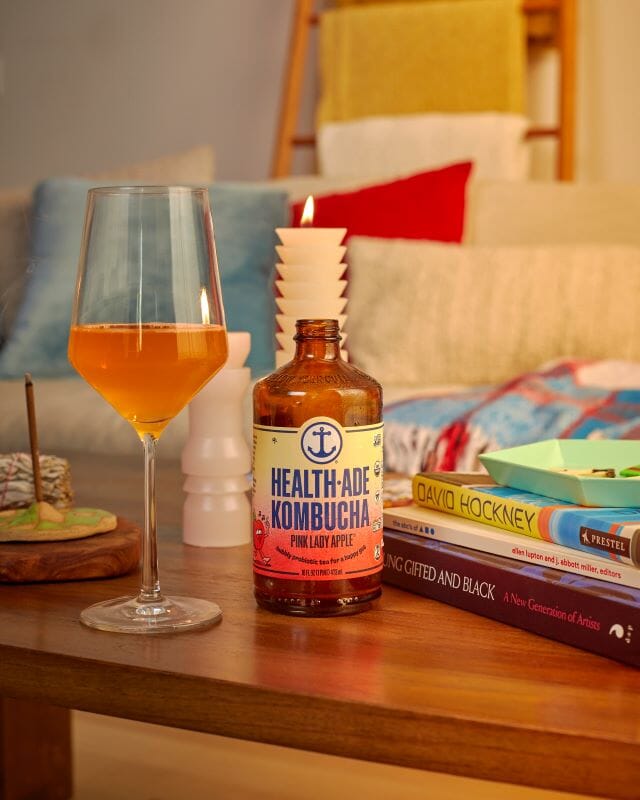
Kombucha | 12 Pack
Fan Favorite Variety Pack
One-time Purchase
49.95

Copied URL to clipboard!
A question we often hear from booch-loving new mamas is “Can I drink kombucha while breastfeeding?”
And the truth is - there is no right way to answer this! As we all know, pregnancy and breastfeeding are highly personal experiences that each woman approaches very differently. While one mom might choose to drink kombucha regularly while pregnant and during breastfeeding, another mom may feel more comfortable getting probiotics from a different source. So asking “Is Kombucha safe while breastfeeding?” is a legitimate question every mom-to-be should ask.
Since this is such a personal choice, Health-Ade doesn’t take a particular position on whether a new mom should or shouldn’t drink kombucha while breastfeeding. But we do want to arm our beloved mamas with info that may help them choose what feels right for them. Because as usual, we believe in following your gut!
Below are some components to consider as you weigh whether or not to drink kombucha during breastfeeding.
Most commercially produced foods in our country are pasteurized, and those that aren’t can pose an additional food safety risk to vulnerable populations like children, elderly, pregnant or breastfeeding moms. That’s why it’s important to examine kombucha breastfeeding effects alongside everything in your diet.
However, raw kombucha is different.
Unlike raw milk, raw cheese, and many other raw, unpasteurized foods, kombucha is highly acidic. The acidity of the beverage is considered an effective way to prevent the growth of harmful pathogens (listeria, salmonella, E.Coli, etc), because these organisms cannot live in the acidic environment. So, while raw kombucha is not pasteurized, it does not carry the same amount of risk as some other raw foods. Even after a bottle of kombucha is opened and exposed to air, the acidity continues to be effective at preventing the growth of pathogens that can cause foodborne illness.
We routinely test our kombucha to make sure the pH is low (very acidic) so that we know for sure the product is safe, while still raw.
Naturally fermented kombucha contains a trace amount of alcohol, since alcohol is a byproduct of fermentation. As the yeast from our SCOBY (Symbiotic Culture of Bacteria and Yeast) consume the sugar in our sweet tea, they produce alcohol and carbon dioxide. The bacteria from the culture then consume the alcohol and produce healthy acids.
However, kombucha is not like beer or wine, in that the fermentation process does not continually increase alcohol content. The yeast and bacteria in kombucha work in symbiosis; as the yeast continue to produce ethanol, the bacteria continue to convert that ethanol into acid. It’s a constant cycle, and thus the alcohol content in kombucha is self-limiting.
Women who choose to avoid alcohol completely during breastfeeding may want to avoid kombucha (and other living fermented foods) too. However, many kombucha breastfeeding moms feel confident drinking it because they like the taste or find that it positively impacts how they feel.
Pregnant and nursing moms are often encouraged to include probiotics in their diet, whether through food or a supplement. Kombucha, if you feel comfortable with the considerations listed above, can be a great way to get naturally-occurring probiotics from a food source. Many moms find that regularly consuming foods with probiotics (like yogurt, kefir, miso, kimchi, and kombucha) helps with digestive issues that can crop up as your body is experiencing hormonal changes. While we don’t claim that our kombucha can treat or prevent any digestive issue, we like to hear our consumers feel good when they drink it! It is important to follow nutritional guidelines while pregnant or breastfeeding.
Health-Ade kombucha begins with a blend of black and green tea. While both of these tea varieties contain caffeine, most of the caffeine goes away during fermentation. We regularly test our products for the caffeine content, and the usual range is between 8-15 mg per serving. This is roughly equivalent to a cup of decaf coffee.
Drinking kombucha while nursing is a great low-caffeine beverage option if you’re watching your overall caffeine intake.
Kombucha that goes through a regulated fermentation process, such as Health-Ade Kombucha, can be a safe drink for women who are pregnant or breastfeeding. But since there are very small levels of alcohol and caffeine in kombucha we believe this is a decision that each individual must make on their own with the consultation of their doctor. If you decide to drink kombucha while pregnant, or if you decide to wait, Health-Ade will be here to provide you with the kombucha you have been craving!
VISIT SHOP